Public Law and Social Media Use by State Officers: Lessons from Chief Justice Twitter Spat with Former Registrar
- Victor Nzomo |
- November 4, 2014 |
- Social Media and the Law

Last month, the estimated 700,000 Kenyans on Twitter were treated to an exchange of tweets by Chief Justice (CJ) Willy Mutunga and the former Chief Registrar of the Judiciary Glady Shollei over a a multi- million shilling residence that was meant to be the official residence of the CJ but which is now the subject of an investigation by the Ethics and Anti Corruption Commission (EACC). This twitter exchange instantly became front page news and has been the subject of online and offline public discussion over the last few days.
On June 20th 2011, Dr. Willy Mutunga, SC was sworn in as the first Head of the Judiciary (i.e. Chief Justice and President of the Supreme Court of Kenya) under the new constitutional dispensation. On June 24th 2011, Mutunga joined two social media sites Facebook and Twitter and within one hour he had 250 likes on Facebook and over 1,000 followers on Twitter.
Many will recall his very first tweets on joining twitter:
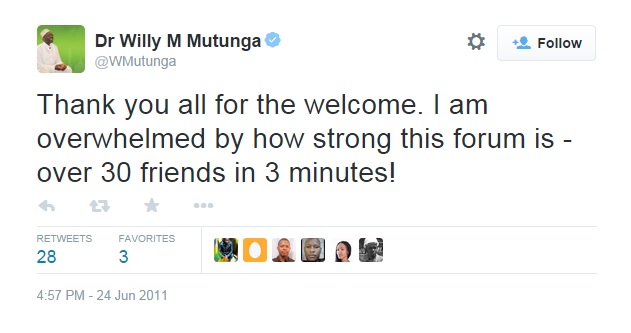
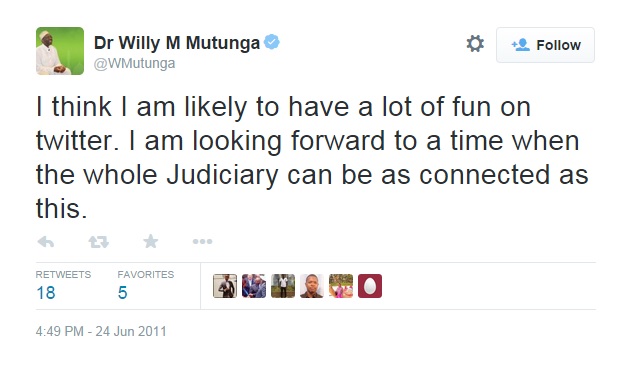
From 2011 fast-forward to today, Mutunga now commands a following of almost half a million social media users worldwide (339,220 twitter followers and 99,291 likes on facebook to be exact). His twitter account is particularly active and most of his followers will attest to the fact that most of the tweets by @WMutunga appear to be posted by Mutunga himself. Mutunga’s tenure as head of the judicial branch of government has been anything but smooth, with the acrimonious dismissal of the Chief Registrar of the Judiciary, Gladys Shollei as well as the former Deputy Chief Justice Nancy Baraza who was forced to resign from the Judiciary following a public altercation with a security guard at a Nairobi shopping mall. However, it is Mutunga’s past connection with Shollei that appears to have fueled the inferno witnessed on social media.
It all started with these two tweets from Mutunga:
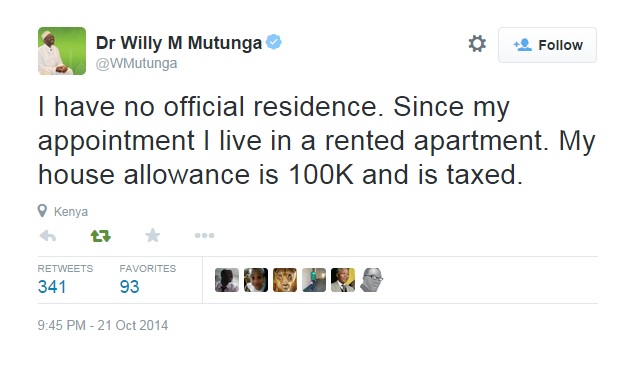
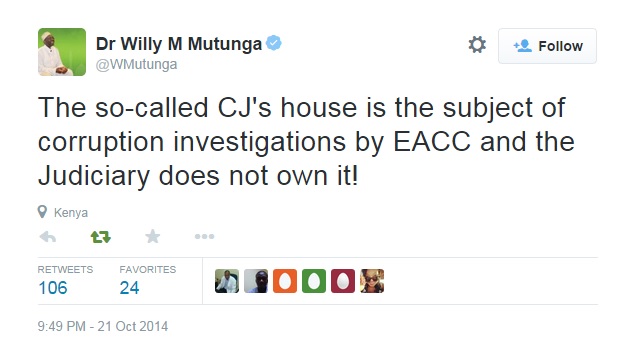
Shollei who was in charge of the procurement of the CJ’s official residence immediately took to Twitter through her personal account “@gladysshollei” to confront her former boss, CJ Mutunga. Shollei uploaded an image which was a scanned copy of a letter apparently from the Chief Justice to the former head of Public Service, Francis Muthaura, dated October 27, 2011, requesting an official residence.
Mutunga responded to Shollei on twitter saying:
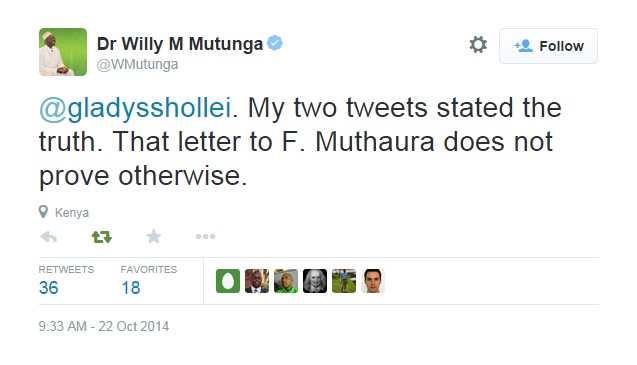
Shollei further posted a series of other letters confirming that the transfer of the property to the Judiciary had been halted after investigations by EACC commenced. Therefore Mutunga’s twitter position appears to be correct since, technically, the Judiciary cannot claim ownership legally and ethically of a property which is the centre of a corruption investigation.
As enthusiasts of social media and the law, this twitter spat is an opportunity to analyse how public servants such as CJ Mutunga ought to use social media especially where the account is directly associated with their public life i.e. the twitter bio of @WMutunga reads: “Chief Justice/President, Supreme Court of Kenya” therefore one would presume that all tweets from that account are made in his official capacity as CJ. Article 260 of the Constitution of Kenya 2010 defines a State Officer as any person who holds a State office. A State office interalia includes office of the: President, Deputy President, Cabinet Secretary, Member of Parliament, Judges and Magistrates, Member of Commission to which chapter fifteen applies. A Public officer is on the other hand ‘any person occupying an office in the national government, a county government or the public service, if the remuneration and benefits of the office are payable directly from the consolidated fund or directly out of money provided by Parliament. The Public Officer Ethics Act defines a “public officer” to mean any officer, employee or member, including an unpaid, part-time or temporary officer, employee or member, of a public entity.
The CJ as a public officer is bound by the provisions of the Constitution, Public Officer Ethics Act and the Official Secrets Acts among other laws providing for the disclosure or non-disclosure of information held by the State. Article 35 of the Constitution expressly provides for citizen’s right of access to information held by the State. The Article states that “The State shall publish and publicize any important information affecting the nation.” However, there is no legislation to regulate which information should be disclosed by who and when. Some information held by State may be too sensitive to be released to members of the public. Consequently, the Public Officer Ethics Act and the Official secrets Act, among other statutes such as the Evidence Act, the Penal Code, the Preservation of Public Security Act, the Public Service Commission Act and the National Security Intelligence Service Act, which restrict disclosure of certain information by public officers.
In the present case, the question which arises is whether the CJ’s tweet about his housing allowance could be classified as “important information affecting the nation”. Furthermore, whether such a disclosure by the CJ was reasonable and justifiable in light of the existing statutory limitations to Article 35 in the case of public officers.
